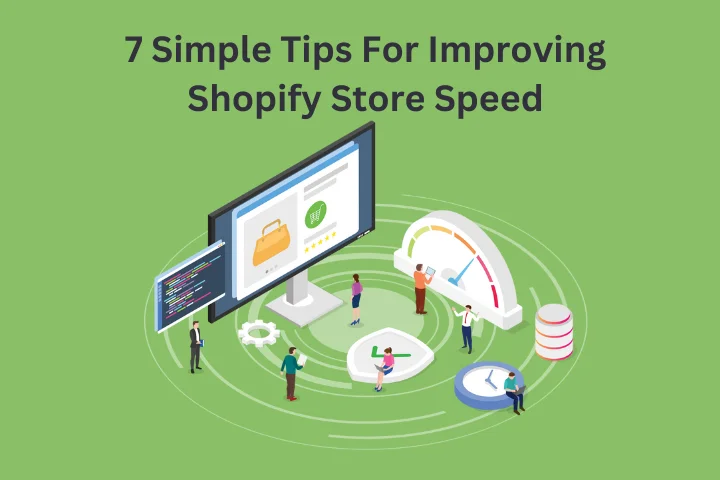Introduction
So, website speed means how fast a website loads and shows its content when you open it via a laptop, desktop, or mobile device. It is the time a website takes while loading on the viewer’s browser. Website loading time is different from one to another; it depends on various factors.
Additionally, Shopify provides a smooth and fast loading space to their users, but there are numerous things that you have to consider to optimize your website fully. To optimize your website speed, you have to understand multiple speed-boosting strategies such as image compression, reducing HTTP requests, and more.
Therefore, in this blog, we will explore the importance of a fast-loading website. Additionally, we will move further toward the process of identifying the website’s current speed. At last, we will discuss top Shopify speed optimization strategies.
8 Reasons Why Does Website Speed Matter
These are the prime reasons why website speed matters for a Shopify store.
First Impressions:
People like fast websites. If a site is slow, visitors might leave before even seeing what’s there. We all agree that first impressions are the most important, so if your website is not fast, you will not get anything like sales, conversion, etc. For this, you have to make your website mobile-friendly. Shopify mobile speed optimization is very important as most people search from their mobile phones.
User Experience:
Faster websites make users happy. They can navigate and find information easily. You have created your store primarily to serve your customers. Thus, you must provide them with exceptional experience and customer support. This is only possible with a fast loading speed.

Want to read this blog offline?
No worries, download the PDF version
now and enjoy your reading later…
Search Engines:
Google and others prefer speedy websites. Websites that load faster may appear higher in search results. To secure a high position on search engines, it is important that you work on the various aspects of your Shopify store. It will help you enhance speed and performance.
Conversion:
If a site loads fast, people are more likely to buy things or click on links. For a high conversion rate, a fast-loading website is a must. Apart from this, ranking, performance, and sales also matter to increase the conversion rate, but if a website loads instantly, your store can get an increment in sales.
Bounce Rate:
Slow sites make visitors leave quickly. High bounce rates mean people don’t stay long. By improving the loading style of your Shopify store, you can quickly reduce website bounce rate. A website with a low bounce rate is equal to a high sales and click-through rate.
Credibility:
Fast websites look professional. Slow ones may make people doubt the site’s trustworthiness. Your visitors will trust your website if it loads according to their needs. You can’t influence them to leave if they are not getting a sufficient outcome. You have to make your website load as per user demand, or else they will leave.
Cost-Efficiency:
Faster websites use fewer server resources, saving money on hosting. While performing multiple Shopify page speed optimization techniques, you can reduce the cost of spending on speed enhancement. Additionally, it helps with ranking and sales, which reduces the investment in marketing.
Competitive Edge:
If your site is faster than others, you might attract more visitors and beat the competition. Nowadays, every business is struggling to do its best in speed optimization and SEO. If you do well on both these aspects, you can get the best outcome and beat your competitors. A fast loading site provides a great competitive edge.
Thus, these are the advantages of Shopify page speed optimization and why it is important for your current store.
How to Test Website Speed?
Measuring the performance of a website is an essential first step in making improvements. A number of factors influence users’ perceptions of a website’s speed and dependability, and the only way to identify which measures would result in the greatest improvement is to measure these characteristics.
There are multiple tools to measure website speed, such as Google Page Insights, which evaluates the website’s current speed and shows suggestions for improvement.
What else do we get after using free speed testing tools? The Core online Vitals, a collection of three indicators that gauge significant facets of online performance, is an excellent place to start:
Largest Contentful Paint gauges how quickly a page’s most oversized and important element loads.
The First Input Delay gauges how fast a page reacts to input from users.
The measure of a page’s elemental visual stability is called Cumulative Layout Shift.
Interaction to Next Paint measures the responsiveness of a website to user queries.
Enhancing a page’s Core Web Vitals not only improves user experience signals but also raises the page’s organic Google search result ranking. Therefore, fixing Shopify core web vitals will lead to improvement in website speed and overall performance.
Now, we will move toward the tips to improve Shopify store speed.
Speed Up, Stand Out, and Sell More – Fast!
Speed Up Shopify Store Now7 Techniques How to Improve Website Speed
These are the techniques to enhance website loading speed and increase sales.
Optimize Images:
The practice of making a picture more suitable for usage on the web by lowering its file size, speeding up the download, and accelerating page load times is known as image optimization. This procedure entails adjusting your photographs’ dimensions, altering the image format, and compressing the file size. This technique improves the website loading speed.
Use Browser Caching:
Browsers save the content of websites in local storage using a process called caching. Users accessing the site again won’t have to download the same information repeatedly. The first time you visit a website, the browser downloads content from the server. Here’s how it works. The browser has cached some of the material, so when you return to the website or refresh it, the loading time will be reduced.
Minimize HTTP Requests:
Too many HTTP requests can slow down website loading speed, so it is important to reduce it. For this reason, minimize the file size and combine the multiple data and files into one. It will lead to reduced HTTP requests and an increase in website loading speed.
Enable Compression:
Using compressing with gzip can lower the size of the sent response by up to 90%, reducing the amount of time it takes to download the resource, reducing data use for the client, and improving the time to initially render your pages.
Select a Reliable Hosting Provider:
For your WordPress website, hundreds of hosting firms are accessible. When it comes to page speed, though, they aren’t all created equal. Slow load times can be caused by hosts that provide little assistance or who rely too much on shared server resources.
Minimize Redirects:
As redirects make a webpage load slower, try to minimize them. Eliminate the use of too many plugins or apps. Never link to an already linked page on your website. Be concerned about the error page not being found. Continuously scan old redirects, as you might have deleted those pages.
Use Content Delivery Networks (CDN):
An image, video, script, and stylesheet copy on your website is stored on a network of servers called a content delivery network, or CDN. The content delivery network (CDN) consumes the content and shows it to the viewer from the network closest to them.
Thus, these are the techniques to optimize the speed of your Shopify website.
Conclusion
Therefore, in this blog, we have started by explaining the basics of speed optimization, and after that, we mentioned the importance of website speed improvement. In the end, we discussed different Shopify page speed optimization tips.
So, if you want to avoid any glitches during the process, you can get help from a speed optimization tool like Website Speedy, which is a SaaS-based tool specially designed to boost website loading speed. Website Speed boosts sales, increases conversion, provides a mobile-first experience, improves ad performance, reduces bounce rate, increases click-through rate, and more.
November 6, 2023
Leave a Comment


































